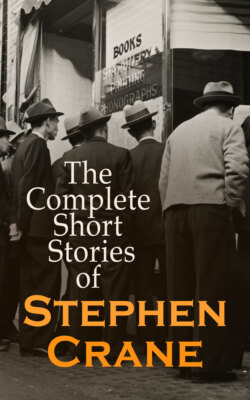Читать книгу The Complete Short Stories of Stephen Crane - Stephen Crane - Страница 34
На сайте Литреса книга снята с продажи.
V
Оглавление"Pie," said the oiler and the correspondent, agitatedly. "Don't talk about those things, blast you!"
"Well," said the cook, "I was just thinking about ham sandwiches, and——"
A night on the sea in an open boat is a long night. As darkness settled finally, the shine of the light, lifting from the sea in the south, changed to full gold. On the northern horizon a new light appeared, a small bluish gleam on the edge of the waters. These two lights were the furniture of the world. Otherwise there was nothing but waves.
Two men huddled in the stern, and distances were so magnificent in the dingey that the rower was enabled to keep his feet partly warmed by thrusting them under his companions. Their legs indeed extended far under the rowing-seat until they touched the feet of the captain forward. Sometimes, despite the efforts of the tired oarsman, a wave came piling into the boat, an icy wave of the night, and the chilling water soaked them anew. They would twist their bodies for a moment and groan, and sleep the dead sleep once more, while the water in the boat gurgled about them as the craft rocked.
The plan of the oiler and the correspondent was for one to row until he lost the ability, and then arouse the other from his sea-water couch in the bottom of the boat.
The oiler plied the oars until his head drooped forward, and the overpowering sleep blinded him. And he rowed yet afterward. Then he touched a man in the bottom of the boat, and called his name. "Will you spell me for a little while?" he said, meekly.
"Sure, Billie," said the correspondent, awakening and dragging himself to a sitting position. They exchanged places carefully, and the oiler, cuddling down in the sea-water at the cook's side, seemed to go to sleep instantly.
The particular violence of the sea had ceased. The waves came without snarling. The obligation of the man at the oars was to keep the boat headed so that the tilt of the rollers would not capsize her, and to preserve her from filling when the crests rushed past. The black waves were silent and hard to be seen in the darkness. Often one was almost upon the boat before the oarsman was aware.
In a low voice the correspondent addressed the captain. He was not sure that the captain was awake, although this iron man seemed to be always awake. "Captain, shall I keep her making for that light north, sir?"
The same steady voice answered him. "Yes. Keep it about two points off the port bow."
The cook had tied a life-belt around himself in order to get even the warmth which this clumsy cork contrivance could donate, and he seemed almost stove-like when a rower, whose teeth invariably chattered wildly as soon as he ceased his labour, dropped down to sleep.
The correspondent, as he rowed, looked down at the two men sleeping under-foot. The cook's arm was around the oiler's shoulders, and, with their fragmentary clothing and haggard faces, they were the babes of the sea, a grotesque rendering of the old babes in the wood.
Later he must have grown stupid at his work, for suddenly there was a growling of water, and a crest came with a roar and a swash into the boat, and it was a wonder that it did not set the cook afloat in his life-belt. The cook continued to sleep, but the oiler sat up, blinking his eyes and shaking with the new cold.
"Oh, I'm awful sorry, Billie," said the correspondent contritely.
"That's all right, old boy," said the oiler, and lay down again and was asleep.
Presently it seemed that even the captain dozed, and the correspondent thought that he was the one man afloat on all the oceans. The wind had a voice as it came over the waves, and it was sadder than the end.
There was a long, loud swishing astern of the boat, and a gleaming trail of phosphorescence, like blue flame, was furrowed on the black waters. It might have been made by a monstrous knife.
Then there came a stillness, while the correspondent breathed with the open mouth and looked at the sea.
Suddenly there was another swish and another long flash of bluish light, and this time it was alongside the boat, and might almost have been reached with an oar. The correspondent saw an enormous fin speed like a shadow through the water, hurling the crystalline spray and leaving the long glowing trail.
The correspondent looked over his shoulder at the captain. His face was hidden, and he seemed to be asleep. He looked at the babes of the sea. They certainly were asleep. So, being bereft of sympathy, he leaned a little way to one side and swore softly into the sea.
But the thing did not then leave the vicinity of the boat. Ahead or astern, on one side or the other, at intervals long or short, fled the long sparkling streak, and there was to be heard the whiroo of the dark fin. The speed and power of the thing was greatly to be admired. It cut the water like a gigantic and keen projectile.
The presence of this biding thing did not affect the man with the same horror that it would if he had been a picnicker. He simply looked at the sea dully and swore in an undertone.
Nevertheless, it is true that he did not wish to be alone. He wished one of his companions to awaken by chance and keep him company with it. But the captain hung motionless over the water-jar, and the oiler and the cook in the bottom of the boat were plunged in slumber.
